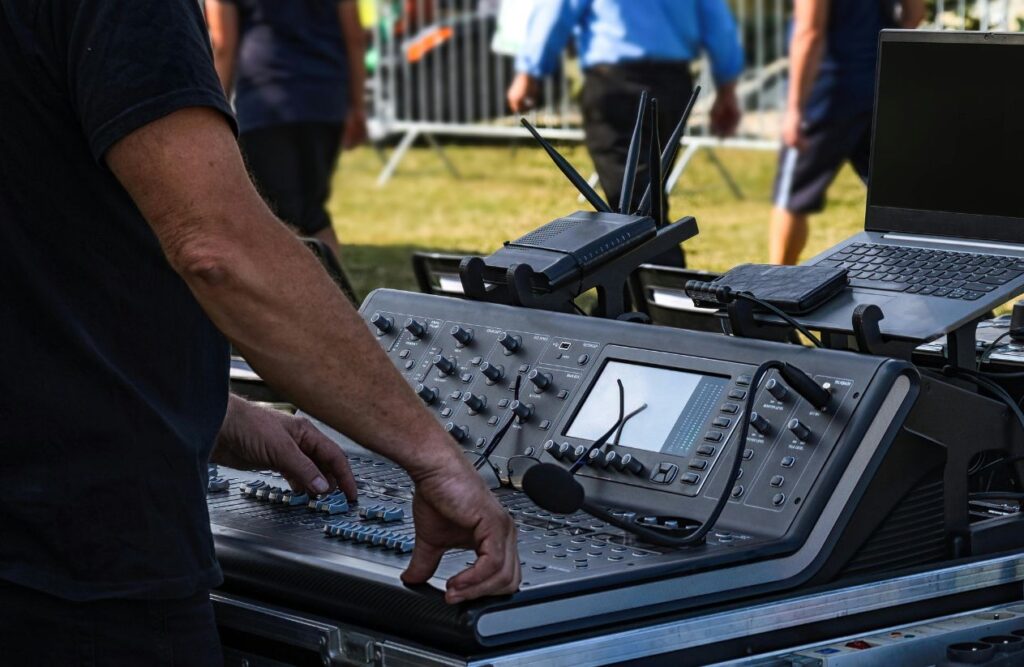The frantic energy of pre-event preparations – the endless spreadsheets, the last-minute logistical puzzles, the constant juggling of attendee needs – is a familiar scene for any event planner. Imagine a world where many of these complexities melt away, replaced by intelligent systems that anticipate needs and optimize every detail.
This isn’t a scene from a sci-fi movie; it’s the burgeoning reality of event planning with AI. Artificial intelligence is rapidly transitioning from a futuristic concept to a fundamental shift in how events are conceived, organized, and executed.
This technological evolution is transforming the industry by empowering planners to craft deeply personalized attendee experiences, streamline intricate operational workflows, and make informed decisions based on insightful data, ultimately paving the way for more successful and truly memorable events.
The Evolving Landscape: Why AI is the Next Frontier for Event Professionals

The Growing Demands of Modern Events
Today’s event attendees arrive with heightened expectations. They crave experiences tailored to their individual interests, seamless transitions between activities, and instant access to information.
From personalized agendas and relevant networking opportunities to smooth registration and on-site support, the bar for engagement and satisfaction has been significantly raised.
Meeting these demands through purely manual planning is becoming increasingly challenging. The sheer volume of data to process, the intricacies of coordinating numerous elements, and the limitations of human capacity often result in inefficiencies and missed opportunities for truly personalized experiences.
AI as the Solution: Addressing Key Pain Points
Artificial intelligence offers a powerful antidote to these challenges, directly addressing the core pain points of modern event planning with AI. Time-consuming logistical tasks, such as attendee registration, scheduling conflicts, and vendor management, can be automated and optimized through AI-powered tools.
The difficulty of achieving personalization at scale is overcome by AI’s ability to analyze vast datasets and identify individual preferences, enabling tailored recommendations and content delivery.
Furthermore, the need for actionable data is met by AI analytics, which can extract meaningful insights from event data, empowering planners to make informed decisions and continuously improve their strategies.
Beyond Automation: The Intelligent Edge
It’s crucial to understand that AI’s role extends far beyond simple automation.While it can certainly streamline repetitive tasks, its true power lies in its ability to provide an “intelligent edge.”
AI algorithms can identify patterns, predict trends (like peak traffic times or popular sessions), and offer proactive recommendations that human planners might miss.This predictive capability allows for more strategic resource allocation, proactive problem-solving, and the creation of truly adaptive event experiences.
By leveraging these intelligent insights, event professionals can move beyond reactive management to proactive orchestration, ultimately delivering superior and more impactful events.
Also Read: Guide to Booking Top Edmonton DJs for Your Event
Crafting Unforgettable Experiences: AI-Powered Personalization for Attendees

Decoding Attendee DNA: Leveraging Data Analytics
The future of event planning with AI hinges on its ability to understand attendees on a deeper level. AI algorithms act as sophisticated data analysts, sifting through various sources of information to build a comprehensive profile of each individual.
This data can include details provided during registration, records of past event interactions (sessions attended, speakers rated, exhibitors visited), and even ethically sourced and anonymized social media activity related to the event’s themes.
By identifying patterns and correlations within this data, AI can uncover individual preferences, learning styles, professional interests, and even potential networking goals. This “decoding” of attendee DNA forms the foundation for truly personalized experiences.
Tailored Journeys: Personalized Content, Recommendations, and Networking
The insights gleaned from data analysis are then translated into tangible personalized experiences. For instance, AI can recommend specific sessions or workshops that align with an attendee’s stated interests or past engagement.
Content delivery can be tailored, with relevant articles or resources suggested through event apps.
Furthermore, AI-powered networking tools can analyze attendee profiles to suggest valuable connections with other participants who share similar interests or professional goals, facilitating more meaningful interactions.
Imagine an attendee receiving a personalized agenda upon arrival, highlighting sessions they’re most likely to find valuable and suggesting individuals they should connect with – this level of tailored experience significantly enhances engagement and satisfaction.
The Conversational Advantage: AI Chatbots for Enhanced Engagement and Support
Beyond proactive personalization, AI-powered chatbots are revolutionizing attendee support and engagement.
These sophisticated conversational agents can provide 24/7 assistance, answering a wide range of queries instantly, from logistical questions about venue locations and schedules to more complex inquiries about specific session content or speaker information.
Unlike traditional FAQs, AI chatbots can understand natural language, provide context-aware responses, and even guide attendees through problem-solving processes in real time.
This immediate and personalized support enhances the overall event experience, reduces the burden on human staff, and ensures attendees feel well-informed and cared for throughout the event lifecycle.
The Efficiency Engine: Streamlining Event Operations and Logistics with AI

Intelligent Forecasting: Predicting Attendance and Optimizing Resource Allocation
Accurately predicting attendee numbers is a perennial challenge for event planners. Overestimating can lead to wasted resources, while underestimating can result in overcrowding and a diminished attendee experience.
AI offers a sophisticated solution through intelligent forecasting. By analyzing historical attendance data, registration trends, marketing campaign performance, and even external factors like economic indicators, AI algorithms can generate far more accurate attendance predictions than traditional methods.
This precision allows for optimized resource allocation, ensuring the right-sized venue is selected, catering quantities are appropriate, staffing levels meet demand, and the correct amount of materials are prepared – all contributing to significant cost savings and a smoother operational flow within event planning with AI.
Automating the Mundane: AI for Registration, Ticketing, and Scheduling
A significant portion of an event planner’s time is often consumed by repetitive administrative tasks. AI-powered tools are revolutionizing these processes, freeing up valuable time for more strategic initiatives.
For registration and ticketing, AI can automate data entry, manage payment processing, generate personalized confirmation emails, and even handle waitlists efficiently.
In scheduling, AI can assist in coordinating speaker availability, room bookings, and session times, minimizing conflicts and optimizing the overall event agenda.
Some AI-powered scheduling tools can even consider attendee preferences to suggest personalized schedules, further enhancing their experience.
Real-Time Adaptability: AI for Dynamic Schedule Adjustments and Crisis Management
The day of the event often brings unforeseen challenges. AI offers the capability for real-time adaptability to manage these situations effectively. By monitoring attendee flow through sensors or app usage data, AI can identify potential bottlenecks or areas of congestion, suggesting real-time adjustments to signage or staffing to alleviate these issues.
In case of unexpected disruptions, such as speaker delays or room changes, AI can rapidly analyze the impact on the schedule and suggest alternative arrangements, automatically communicating these changes to affected attendees through event apps or digital displays.
This ability to react dynamically ensures smoother event execution and minimizes the impact of unforeseen circumstances.
Data-Driven Decisions: Harnessing AI Analytics for Continuous Improvement

Unlocking Actionable Insights: Analyzing Attendee Behavior and Engagement
The wealth of data generated during an event holds immense potential for future improvement, and AI analytics is the key to unlocking these actionable insights.
AI algorithms can process vast amounts of information, including session attendance records, real-time feedback from event apps, survey responses, and even social media sentiment surrounding the event.
By identifying patterns and correlations within this data, AI can reveal which sessions were most popular, which speakers resonated most with the audience, and the overall sentiment towards different aspects of the event.
This granular level of analysis provides a clear picture of what worked well and areas that could be enhanced in future iterations of event planning with AI.
Optimizing Future Events: Identifying Trends and Preferences
The insights derived from AI-powered analytics are invaluable for optimizing future events. By understanding attendee preferences for specific topics, formats (e.g., workshops vs. lectures), and networking activities, planners can curate more relevant and engaging content.
Data on marketing channel effectiveness and attendee demographics can inform future marketing strategies, ensuring resources are allocated efficiently to reach the target audience.
Furthermore, analyzing feedback on the event format itself can guide decisions on layout, technology adoption, and overall event design, leading to continuous improvement and increased attendee satisfaction in subsequent events.
Measuring ROI and Impact: Demonstrating the Value of Events with AI Analytics
Demonstrating the return on investment (ROI) of an event is crucial for securing future budgets and stakeholder buy-in. AI-powered analytics provides the tools to quantify event success beyond simple attendance numbers.
By tracking metrics such as lead generation from specific sessions or exhibitor interactions, the impact of networking activities on business outcomes, and the overall engagement levels of different attendee segments,
AI can provide concrete data points that demonstrate the tangible value of the event. This data-driven approach allows event planners to communicate the impact of their work effectively and justify the resources invested, solidifying the strategic importance of events within an organization.
The Creative Catalyst: AI Empowering Performers and Enhancing Audience Engagement

AI as a Creative Partner: Assisting Musicians and DJs with Music Generation and Remixing
The future of event planning with AI extends beyond logistics and attendee management to empower the very artists who create memorable experiences. AI is emerging as a powerful creative partner for musicians and DJs.
Tools like Amper Music and LANDR utilize sophisticated algorithms to generate original music across various genres, offering artists a starting point for compositions or the ability to create dynamic background scores tailored to specific event moments.
Furthermore, AI-powered remixing software, such as iZotope RX, assists DJs in seamlessly blending tracks, identifying harmonic matches, and even creating unique mashups in real-time.
These technologies don’t replace human artistry but rather augment it, providing new avenues for experimentation and accelerating the creative process. Artists can use AI to overcome creative blocks, explore unconventional sonic landscapes, and craft truly unique performances.
Interactive Experiences: AI-Driven Real-Time Audience Participation
AI is also breaking down the traditional barrier between performer and audience, fostering more interactive and engaging experiences.
Imagine a DJ set where the audience can vote on the next track via a mobile app powered by AI, or a concert where the intensity of the lighting visuals is influenced by the collective cheering of the crowd, analyzed in real-time by AI algorithms.
Companies like Votemo offer platforms that integrate audience feedback into live events, and AI can analyze this data to dynamically adjust elements of the performance. This level of real-time interaction transforms the audience from passive observers to active participants, creating a shared and more memorable experience where their input directly shapes the event.
Immersive Environments: AI for Synchronized Visuals, Lighting, and Stage Effects

The visual and auditory aspects of a performance are intrinsically linked, and AI is enabling a new level of synchronization and immersion.
AI software can analyze the tempo, rhythm, and even the emotional nuances of music in real-time to control lighting cues, video projections, and other stage effects.
Tools like Resolume and others are integrating AI capabilities to automate these processes, creating a cohesive and dynamic sensory experience. For example, AI could trigger specific lighting patterns during a song’s climax or synchronize abstract visuals with the melodic progression.
This intelligent automation allows performers to focus on their artistry while delivering a visually stunning and emotionally resonant show, further captivating the audience and elevating the overall impact of the event.

Identifying the Right Tools: A Guide to Different AI Solutions for Event Planners
Embarking on the journey of event planning with AI requires understanding the diverse range of tools available. Several categories of AI solutions cater to specific needs.
For registration and ticketing, platforms with AI-powered features can streamline the process and offer personalized check-in experiences. AI analytics tools provide valuable insights into attendee behavior and event performance.
Chatbots, as discussed earlier, enhance communication and support. Scheduling tools leverage AI to optimize agendas and manage logistics.
When choosing these tools, consider factors such as your specific event needs, the size and complexity of your events, the integration capabilities with your existing systems, the user-friendliness of the interface, and, of course, the cost and return on investment.
Start with identifying your biggest pain points and then explore AI solutions that directly address those challenges.
Data Privacy and Ethical Considerations: Ensuring Responsible AI Implementation
As AI in event planning relies heavily on data, particularly attendee information, adhering to strict data privacy and ethical guidelines is paramount.
When implementing AI tools that collect and analyze personal data (registration details, event interactions, etc.), ensure compliance with relevant regulations like GDPR or local data protection laws.
Transparency with attendees about how their data is being used is crucial. Implement robust security measures to prevent data breaches and unauthorized access.
Furthermore, be mindful of potential biases in AI algorithms and strive for fair and equitable outcomes in personalization and recommendations. Responsible AI implementation builds trust with attendees and safeguards your reputation.
The Human Element Remains Crucial: AI as an Augmentation, Not a Replacement
While AI offers tremendous potential to enhance efficiency and personalization, it’s essential to remember that it is a tool to augment human capabilities, not replace them entirely. The creativity to conceptualize unique event experiences, the empathy to understand and respond to individual attendee needs on a human level, and the strategic thinking required to navigate complex situations remain uniquely human strengths.
AI excels at processing data and automating tasks, but the nuanced decision-making, the ability to build genuine connections, and the innovative spark that drives truly exceptional events still rely on the expertise and intuition of event professionals.
The most successful integration of AI in event planning will be a collaborative partnership between human planners and intelligent technologies.
Conclusion
In essence, AI is reshaping the very fabric of event planning with AI, moving us beyond manual processes towards a future of intelligent automation and hyper-personalization.
From decoding attendee preferences to streamlining intricate logistics and even amplifying the creativity of performers, AI is empowering event professionals to craft experiences that are not only efficient but also deeply resonant.
Looking ahead, the evolution of AI promises even more groundbreaking innovations, potentially leading to fully adaptive events that respond in real-time to individual and collective needs, creating truly unique and impactful moments.
The time is now for event planners to explore and embrace the transformative power of AI tools, unlocking new levels of efficiency, engagement, and ultimately, event success. Don’t get left behind – delve into the possibilities and discover how AI can elevate your event planning strategies today.
Are you looking for a Musician for your event? Below is a list of Musicians that we recommend:
Event Planning with AI- FAQ Section
In the rapidly evolving landscape of event planning, Artificial Intelligence (AI) has emerged as a pivotal tool, transforming how professionals approach their tasks.
While the adoption of AI promises efficiency and innovation, it also raises several questions among event planners.
Here, we delve into some of the most common queries, providing clear insights to help integrate AI seamlessly into your event planning processes.
How Does AI Enhance Event Planning?
AI-powered tools can automate attendee registration, personalize event experiences based on attendee behavior and preferences, and provide real-time analytics for making informed decisions.
Is Implementing AI in Event Planning Cost-Effective?
Implementing AI-based solutions may require a significant investment, both in terms of financial resources and time spent learning new systems.
What Skills Do Event Professionals Need to Harness AI Effectively?
You don’t need in-depth tech knowledge to use AI. Focus on understanding data, staying updated on new AI tools, and being open to collaborating with tech experts.






